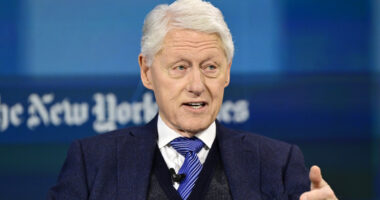Donald Trump’s election as the next American president could jeopardise Anthony Albanese’s chances at next year’s election, a new poll has found.
The Prime Minister Anthony Albanese’s Labor Party is now trailing Opposition Leader Peter Dutton’s Coalition, which is ahead 51 to 49 per cent after preferences, a Freshwater Strategy poll found.
The poll for The Australian Financial Review, published on Monday, also found 47 per cent thought Mr Dutton would be better able to engage with President Trump, compared with 36 per cent for Mr Albanese.
When the Coalition was last in power in 2018, then Liberal prime minister Malcolm Turnbull was able to get an exemption from 25 per cent tariffs on steel and 10 per cent import taxes on aluminum.
Mr Albanese last week confirmed he had raised the issue of the United States, Australia’s biggest defence ally, having a trade surplus with Australia – something which Mr Turnbull did during Trump’s first term in power.
Environment Minister Tanya Plibersek said a Labor government could easily work with a Republican administration, despite being on the opposite side of politics.
‘The Prime Minister’s already had a terrific conversation with Mr Trump, incoming President-elect Trump, and in that conversation, they’ve made the point that we have a very good and close relationship whether it’s the Democrats or the Republicans in power in the U.S. or Liberal or Labor in Australia,’ she told Sunrise on Monday.

Donald Trump ‘s election as the next American president could jeopardise Anthony Albanese’s chances at next year’s election, a new poll has found
‘We’ve had a good and close relationship that’s lasted many decades and that’ll continue.’
Opposition frontbencher Barnaby Joyce, a former Nationals deputy prime minister, hinted the Coalition would appeal to the kind of working class voters in Australia who voted for President Trump.
‘Where President-elect Trump will go is look after the American people first and that is the new reality,’ he said.
‘We have to look behind that and say, “Why do people believe that Mr Dutton would be better with Mr Trump?”.
‘He will put aside some of the rhetoric, put aside some of the noble causes that lead to destitution and really concentrate on the Australian people.’
The poll also found the cost of living to be the top concern with 77 per cent of voters nominating it as their key issue.
The weekend online poll of 1,046 voters also found 43 per cent preferred the Coalition to manage the economy with just 26 per cent favouring Labor.
The gap between the major parties was just as stark on the issue of immigration with 43 per cent favouring the Coalition and just 24 per cent supporting Labor.
This occurred as 449,060 migrants moved to Australia in the year to September, which is well above Treasury’s May Budget forecast of 260,000 for 2024-25 during a housing affordability and rental crisis.
With an election due by May, Ms Plibersek claimed the Opposition was yet to release its economic plan.

The Prime Minister Anthony Albanese ‘s Labor Party is now trailing Opposition Leader Peter Dutton ‘s Coalition, which is ahead 51 to 49 per cent after preferences, a Freshwater Strategy poll found
‘The election has to be by May next year at the latest so it’s true, we’re only a few months away,’ she said.
‘And it’s extraordinary, given we’re only a few months away, that the Coalition can’t tell you what their plans are.
‘They can’t tell you what their plans are for cost-of-living, they can’t tell you what their plans are on tax, they can’t tell you what their plans are on jobs, we’ve got a very clear record that we’ll be discussing with the Australian people and a clear offering for the future.’
Mr Joyce said Labor’s plan for renewables to make up 82 per cent of Australia’s energy mix by 2030 was unrealistic, with the Coalition taking a nuclear energy plan to the next election.
‘If you want to bring down the cost of living, you cannot say I’ll bring down the cost of living but have 82 per cent renewables, intermittent power,’ he said.
‘It’s emblematic of a government that has lost sight of the people they are supposed to serve.’
While the Coalition is ahead on primary votes, with 40 per cent support, it has a difficult task in winning 18 seats to have the required 76 seats needed to form a majority government next year.
Labor’s primary vote of 30 per cent is much lower but having 78 seats now in the House of Representatives, it could rely on the Greens to form minority government, with the hard left minor party having 14 per cent support.





